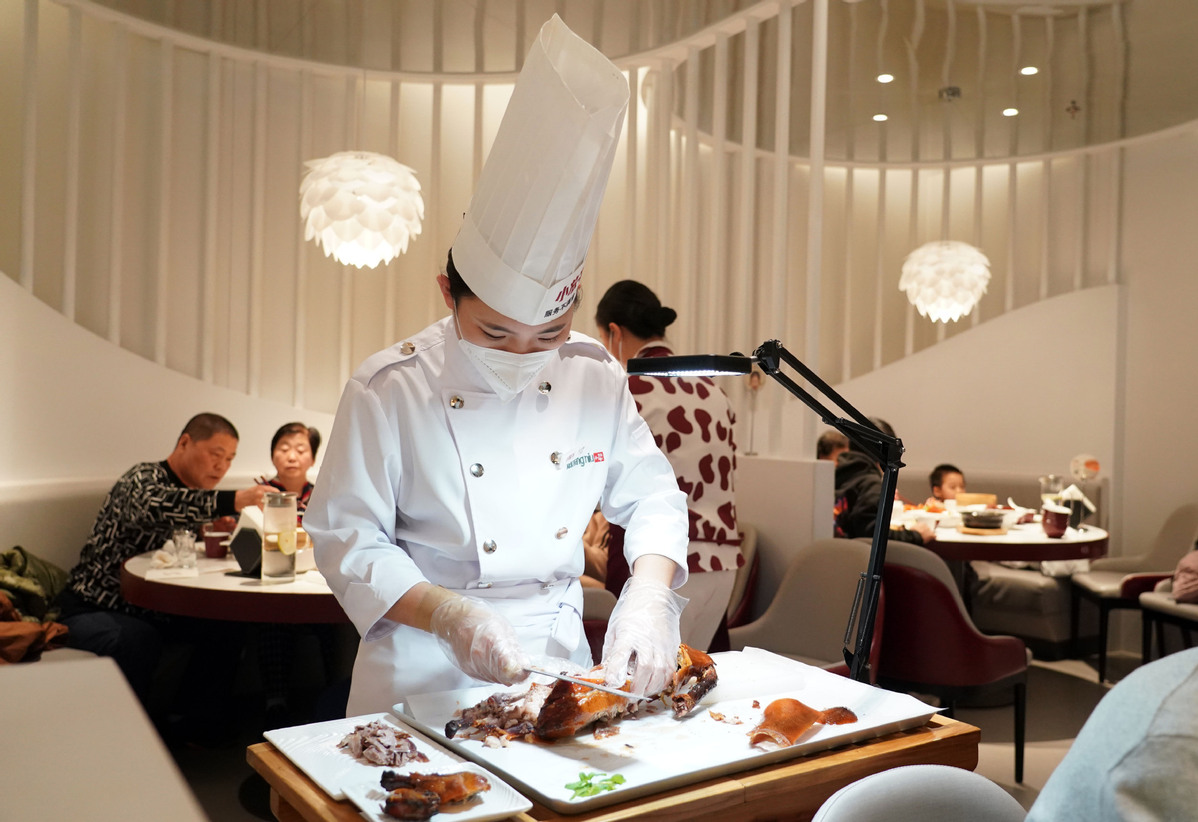Dine-in patrons flock to restaurants

A cook serves roast duck for customers at a restaurant of a shopping mall in Beijing, capital of China, Dec 25, 2022. [Photo/Xinhua]
Yi Yi, a 35-year-old father and a medical professional in Beijing, took his family to a hot spring resort in suburban Fangshan district on Christmas Eve. On Christmas Day, the family dined at a chain hotpot restaurant.
With China relaxing COVID-19 control measures and the New Year approaching, consumers have shown a growing demand for dine-in services. Many large-scale chain restaurants in Beijing are the first to see long lines of customers waiting during peak hours.
While many cities have seen surging COVID-19 infections since early December, a large number of people have recovered from the infection and started to dine out again.
"My family has recovered from COVID. On Christmas Day, we arrived at the Jubaoyuan mutton hotpot restaurant at 5:30 pm, and it was already full of people. The street was crowded and the restaurant was bustling. The scene seemed like we have returned to the pre-pandemic period, and I am confident about the consumption revival in the coming year," Yi said.
Many restaurants in Beijing said they have prepared to have enough food supplies and staff for the upcoming New Year holiday, and they expect customer flows during the holiday to be at least 70 percent to 80 percent of the level seen in the same period of the past few years amid the pandemic.
Wang Kun, manager of a Beijing branch of Japanese chain restaurant Jiuben Izakaya, said he has seen a surge in customer traffic since Saturday, which was Christmas Eve.
The average seating rate in the past two days was about 80 percent, higher than the 50 percent before the holiday. During peak hours, the waiting time was around 20 to 30 minutes, he said.
"The first group of people who were infected have mostly recovered," Wang said. "As the government has optimized COVID prevention and control measures, customers no longer need to scan their health codes when entering restaurants. It is expected that the recovery in the catering sector will continue in the upcoming New Year holiday."
Beijing's Huda Restaurant, a chain that is famous for crawfish, a delicacy that is popular on Chinese dinner tables and as a late-night snack, began to see an increasing number of diners since the FIFA World Cup soccer final on Dec 18.
"With the upcoming holiday season, the seating rates at our restaurants are expected to further increase. Our flagship outlet has resumed late-night operation until 3 am," said Zhang Shengtao, Huda's operations director.
Major commercial complexes in Beijing have launched various sales promotions ahead of the holiday season, and they have seen a growing number of consumers.
On Christmas Eve, Mary Guo, an office employee in Beijing, went to have dinner at Beijing's Solana Mall in Chaoyang district. She waited for seats at a restaurant for more than an hour and couldn't get one, so she chose to go to another mall.
Zheng Tie, deputy director of China World Mall, which is in the central business district of Beijing, said the mall has seen an apparent trend of consumption revival, with people waiting for parking spaces and restaurant seats.
Photos
Related Stories
- People's lives, business recovering from COVID-19
- China's Xinjiang gears up for economic recovery
- Investment fair displays global confidence in China's economic rebound
- Resilient China injects certainty into global economic recovery
- China to ensure stability in growth, employment and prices to keep major economic indicators within a proper range
- RCEP, BRI contribute to global post-pandemic recovery: academics
Copyright © 2022 People's Daily Online. All Rights Reserved.









